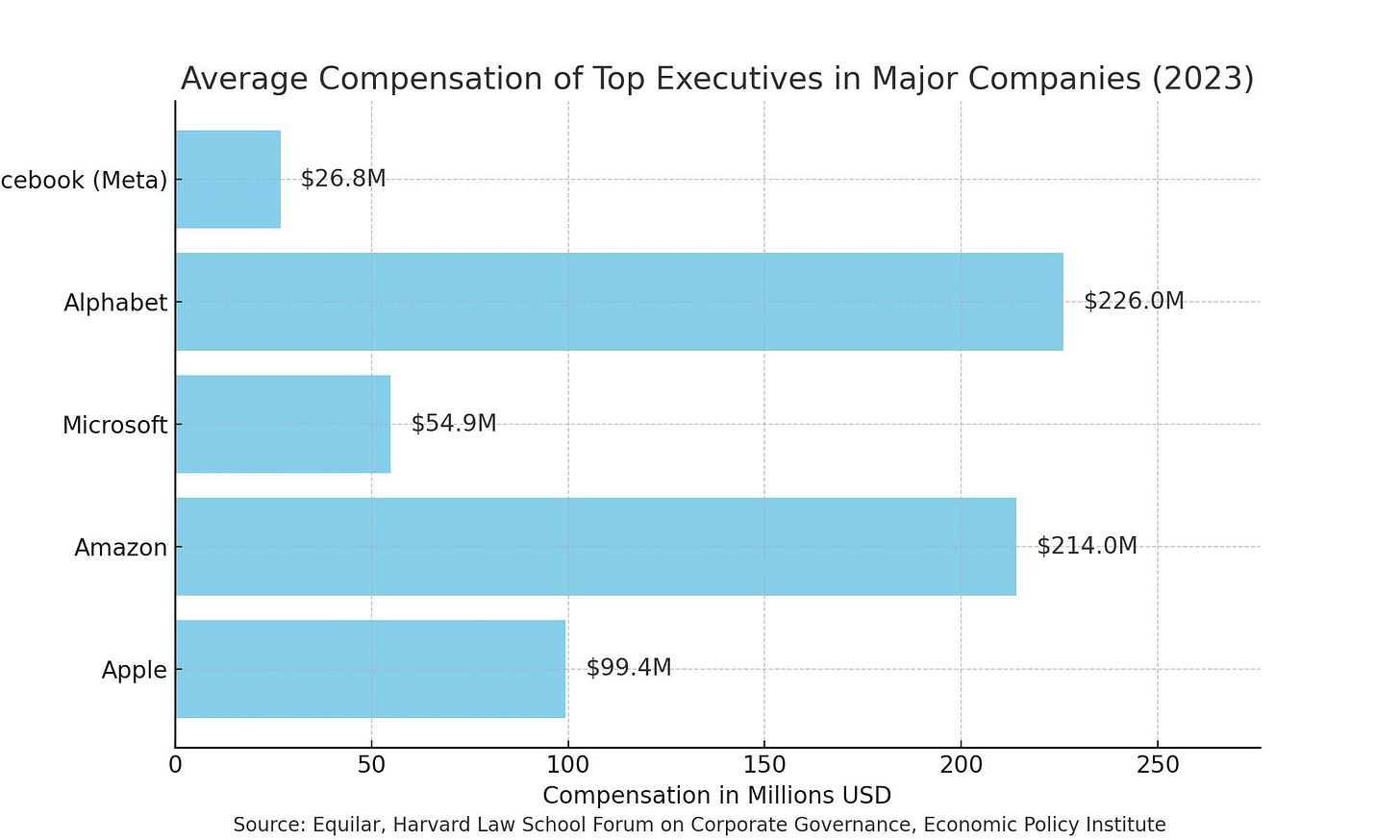Management compensation: Why you need consider it before making an investment
Hello investors!
We continue our exploration of various topics in business and investing, diving deeper into the nuances that can make or break an investment. Today, our focus is on a critical, yet often overlooked aspect: management compensation.
In todays letter
Learning: Understanding Management Compensation and why it’s important
News insights
Legacy Systems Hinder Singapore Insurance Innovation
Korea and UAE Ink $1.5B LNG Carrier Deals
Uttar Pradesh Eyes $2B in Aviation Investments
Key takeaways from Novartis CEO Vas Narasimhan on The David Rubenstein Show
Management compensation: Why you need consider it before making an investment
In public companies, management compensation refers to the total remuneration received by executives, which typically includes salaries, bonuses, stock options, and other financial benefits. Warren Buffett often emphasizes that the structure of this compensation is one of the most crucial elements to scrutinize when evaluating an investment.
A Personal Example
A while back, I was on the lookout for investment opportunities and stumbled upon a firm that was grossly undervalued by the market. With a market cap of just $200 million, its revenues were nearly three times that amount. However, the company was not turning a profit, though it had a slightly positive cash flow. Intrigued, I dug deeper.
The company, with a 30-year history, dominated its market and was well-regarded by both customers and competitors. Yet, I discovered a significant red flag: the management’s compensation was tied to EBITDA (Earnings Before Interest, Taxes, Depreciation, and Amortization) rather than cash flow or profit. Despite the company’s losses, the executives were raking in $10 million annually because the EBITDA was growing. This misalignment turned what could have been a successful company into a financial loser.
Key Considerations for Management Compensation
Whether in a public or private company, here are essential points to consider regarding management compensation:
Tie Compensation to Real Results
Management compensation should be closely linked to metrics that reflect the company’s true financial health, such as cash flow. For instance, a study by McKinsey & Company found that firms with compensation structures tied to cash flow saw a 30% higher return on investment compared to those focusing solely on profit metrics.
Management as Co-Owners
Top managers should have skin in the game, meaning they should be co-owners of the business. When executives hold significant equity, their interests align more closely with those of shareholders. Consider Amazon: Jeff Bezos’s substantial ownership stake has ensured that his incentives are in line with long-term shareholder value creation, contributing to Amazon's phenomenal growth.
Performance-Based Incentives
Incentives should be performance-based and tied to long-term goals. For example, Apple's executive compensation plan includes stock options that vest over several years, contingent on the company's performance. This strategy ensures that executives focus on sustainable growth rather than short-term gains.
Transparency and Accountability
Companies should maintain transparency in their compensation practices. Shareholders should have a clear understanding of how and why executives are compensated. This transparency builds trust and holds management accountable. Berkshire Hathaway, under Buffett’s leadership, exemplifies this practice by providing detailed reports on executive compensation, directly tying it to performance and shareholder value.
Wisdom from Buffett and Munger
Warren Buffett and Charlie Munger have long advocated for compensation structures that promote long-term value creation. Buffett’s 2020 letter to shareholders highlighted the importance of aligning CEO pay with shareholder interests, noting that, "Incentives are everything. Don’t expect rational behavior if incentives aren’t aligned with goals."
Charlie Munger, echoing this sentiment, once said, "Show me the incentive, and I will show you the outcome." This principle underscores the need for compensation strategies that drive the right behaviors and outcomes in management.
In conclusion, understanding and evaluating management compensation is vital for making informed investment decisions. By focusing on cash flow, encouraging management ownership, implementing performance-based incentives, and ensuring transparency, investors can safeguard their investments and promote sustainable company growth.
News insights
Legacy Systems Hinder Singapore Insurance Innovation
A recent survey by EPAM Systems found that outdated legacy systems are stalling innovation in Singapore's insurance industry, with 45% of companies identifying these systems as major barriers to adopting new digital tools. The report emphasizes the need for digital transformation to maintain competitiveness and deliver enhanced value.
[📝Full article]
Key takeaway
For investors, this news highlights a critical area for potential growth in the insurance sector through digital modernization. Investors should monitor companies that are actively investing in updating their technology infrastructure and adopting AI and data solutions, as these firms are likely to gain a competitive edge in the evolving market.
Korea and UAE Ink $1.5B LNG Carrier Deals
During President Mohamed bin Zayed Al Nahyan's state visit to Korea, 19 agreements and MOUs were signed, including a significant $1.5 billion deal for LNG carriers between Korean and UAE companies. The agreements span various sectors such as energy, defense, and AI, highlighting the strategic cooperation between the two nations.
[📝Full article]
Key takeaway
For investors, this news underscores the deepening economic ties between Korea and the UAE, particularly in energy and defense. Investors should watch for opportunities in companies involved in these deals, as these sectors are likely to see substantial growth and investment inflows due to these strategic agreements.
Uttar Pradesh Eyes $2B in Aviation Investments
The Uttar Pradesh government aims to attract $2 billion in private investment for the civil aviation sector, focusing on upgrading airstrips and infrastructure to boost aviation growth. The state saw a 20% increase in flyers in FY24, reflecting a surge in both leisure and business tourism.
[📝Full article]
Key takeaway
For investors, this initiative signals significant opportunities in the civil aviation sector in Uttar Pradesh. Monitoring developments in infrastructure upgrades and new routes could reveal promising investment prospects, particularly in companies involved in aviation training, aircraft maintenance, and aero-sports.
Key takeaways from Novartis CEO Vas Narasimhan on The David Rubenstein Sho
Here are five great takeaways from the video featuring an interview with the CEO of Novartis:
Drug Development and Innovation: Novartis invests around $9.5 billion annually in research and development, focusing on creating innovative medicines. The CEO emphasizes the importance of continuous innovation and the capacity to replace existing drugs with new ones to maintain growth and competitiveness.
Key Medicines and Therapeutic Areas: Novartis produces several major drugs, including Entresto for heart failure, Cosentyx for immunology, and Kisqali for breast cancer. The company is also advancing in RNA therapeutics, aiming to create medicines with infrequent dosing for conditions like high cholesterol and hypertension.
Challenges and Opportunities in the Pharmaceutical Industry: The CEO discusses the industry's reliance on patent protection, which lasts 17 years, necessitating constant innovation to replace drugs that go off-patent. The focus on developing new therapies, especially for chronic and complex diseases like Alzheimer’s and cancer, remains crucial.
Strategic Business Decisions: Novartis has streamlined its operations by spinning off or selling non-core businesses such as generics and consumer health. This strategic focus allows the company to concentrate on its strengths in developing novel, breakthrough medicines and maintaining a robust R&D pipeline.
Future of Medicine and Technology: The CEO highlights the potential impact of artificial intelligence (AI) and advanced therapeutic technologies on drug discovery and development. Collaborations with companies like Google DeepMind and Microsoft aim to accelerate innovation and improve the efficiency of clinical trials and drug optimization.
Thank you for the reading and see you next time!






